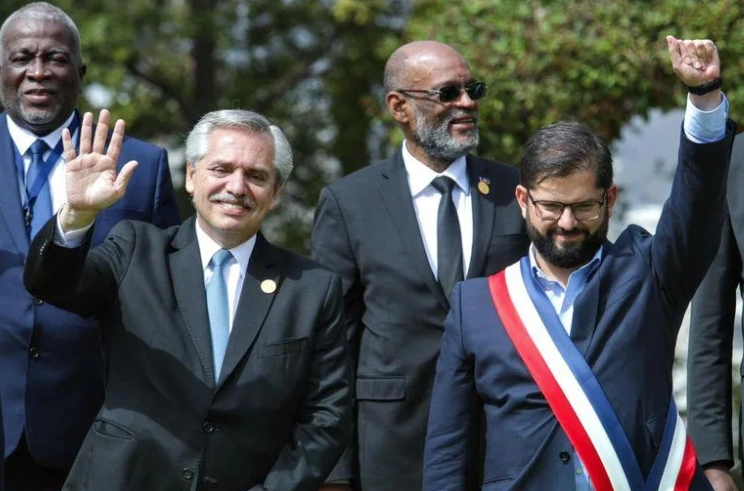Is the left emerging in Latin America a déjà vu of that of the beginning of the 21st century? Or is it a different left? It is neither similar, nor different. Political columns in the media are finding again a political change in the region. Gabriel Boric’s triumph in Chile, the still undefined proposal of Pedro Castillo in Peru, along with the victories of Xiomara Castro in Honduras, Laurentino Cortizo Cohen in Panama, the return of the MAS in Bolivia, the potential victories of Gustavo Petro in Colombia and Lula da Silva in Brazil, and the established administrations of Andres Manuel Lopez Obrador, or AMLO, in Mexico and Alberto Fernandez in Argentina have all marked a turning point in the region. In other words, a broad and generous definition of leftist governments.
The beginning of the 21st century has colored the new governments of the region as leftist. Hugo Chávez, Lula, Néstor Kirchner, Michelle Bachelet, Tabaré Vázquez, José Mujica, Fernando Lugo, Evo Morales, Rafael Correa and some others reconfigured the political map of Latin America. But there was a novelty, which was that all of them converged in a different left with respect to the leftist ideologies that were proposed as alternatives in the sixties and nineties.
Those new left movements were not considered Marxist. Instead, they received different names to characterize them, such as new left, or progressivism, or neo-populism. Thousands of books have been written to understand the nature of these lefts.
A new new left
After a “soft” turn to the right, a new wave of leftist governments has emerged with a different nature and with different programs, objectives and visions. All of that, depending on the reality of the countries and, not to mention, their vision of globalization and their economic and geopolitical interconnectedness to the world.
A first axis for analyzing this new left is the evident heterogeneity of its nature and programmatic objectives. Beyond the “left” moniker, a first look reveals quite dissimilar tones between what embodies a left represented by Boric and Petro relative to Castillo’s left and, all of them with the very possible return of a Lula-da-Silva left, always considered iconic in Latin America’s left.
Boric and Petro could be defined as a left with a social-democratic overtone, but strongly interconnected with post-material claims that come from new social subjectivities. Meanwhile, the Peruvian left has an electoralist discourse with a Marxist cut, which is mixed with a worldview of the highland and indigenous traditions, many of which are culturally conservative.
A second axis of analysis notes the structural frameworks in which this new left would be deployed. It seems that Boric and Petro gather social demands that have resulted from economically thriving societies, which nonetheless highlight the social inequalities that delineate the region. They are spokespersons of a very-dynamic generational change in their respective countries that came out to the public space to demand a new “order of things”.
These new generations demand public policy on what should be a fair life: environment, gender, sexuality, minorities, control of one’s own life. In other words, they demand freedoms and that is new in the history of the left in the region. They are liberal freedoms and have all the charge that the political concept of liberalism has always had in the Latin American left.
A third axis of analysis is the positioning of these leftists in relation to the global economic order, which has been consolidated as a globalist and capitalist order after almost twenty years of dominance of the Latin American left in the 21st century.
If the first leftist governments of the 21st century generated resistance to the economic order with organizations such as the Bolivarian Alliance for the Peoples of Our America, or ALBA, or concepts such as “Bolivarian socialism” or “good living”, these new lefts emerge in an economic system that absolutely constrained within the framework of global financial capitalism. Perhaps that’s why they “dodge” economic definitions in their political programs, beyond all claims for a better and fairer distribution of wealth.
There’s something new in Latin American politics that awakens hope if it comes to replace the ultra-right of Jair Bolsonaro, Ivan Duque or Nayib Bukele, leaders that are considered neoliberal when it comes to economic policy and authoritarian-repressive when it comes to politics. As a new political phenomenon, it is necessary to define it and understand it in its vision of the new subjectivities that constitute social life.
Does this new left bring with it novelties? Undoubtedly. Starting with that they have forgotten the old myths and have distanced themselves from Nicolás Maduro and Daniel Ortega, who are the hangover of the 21st century lefts.
Translated from Spanish to English by Ricardo Aceves











